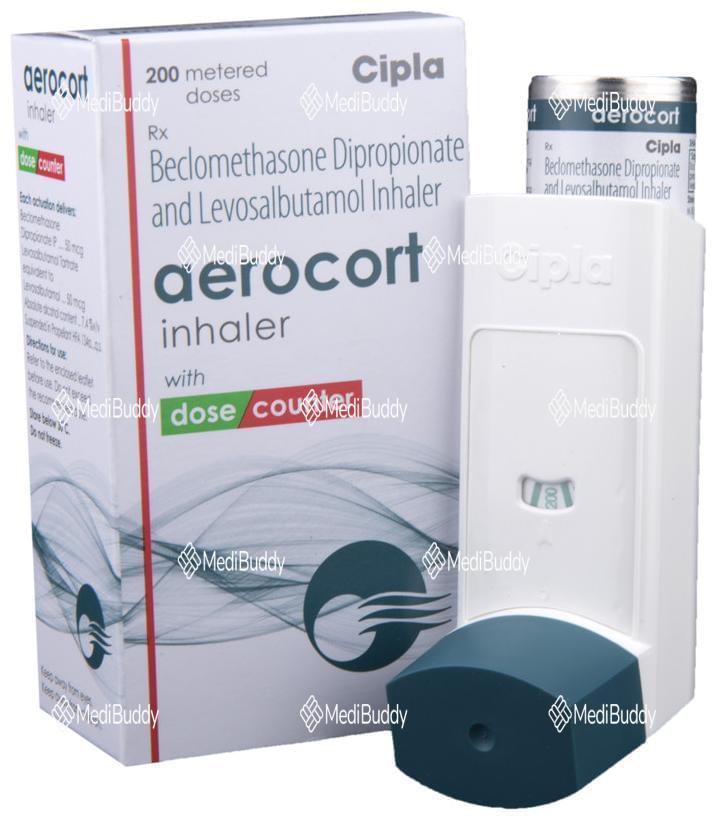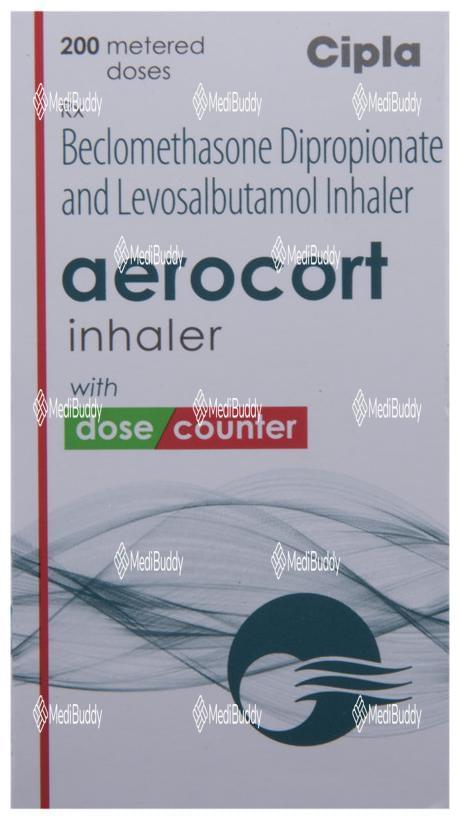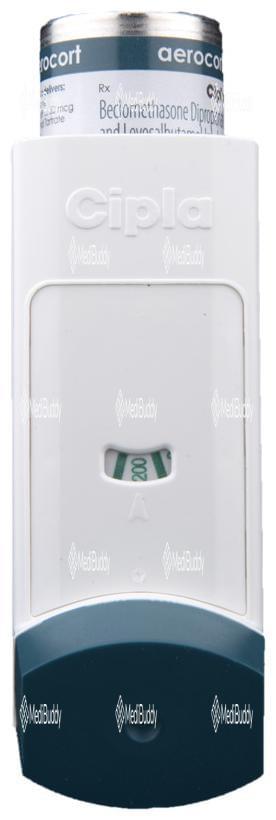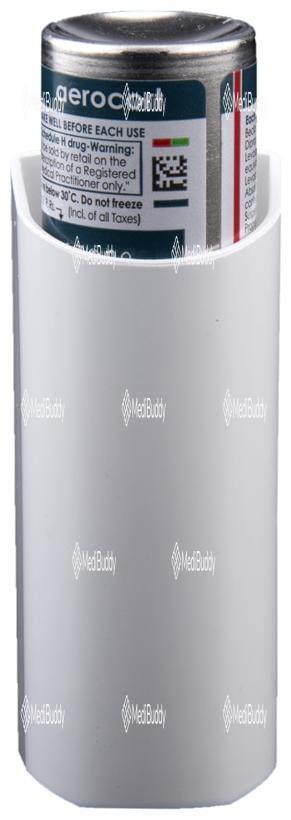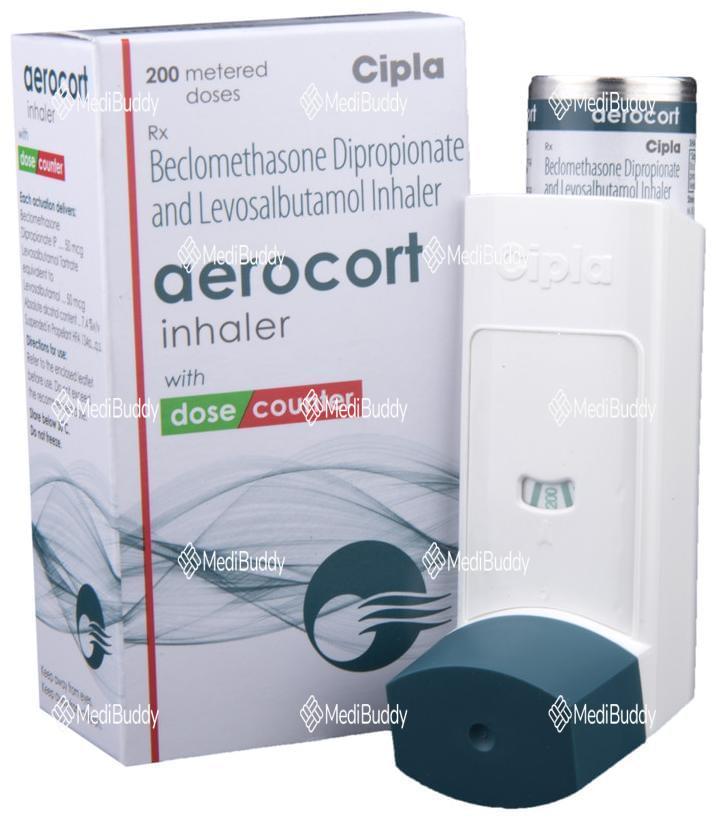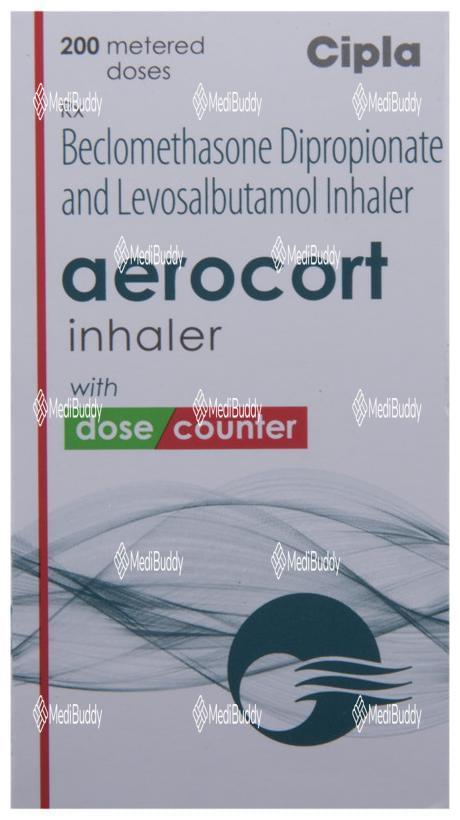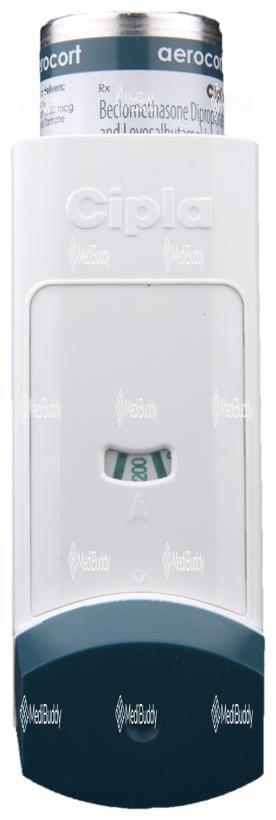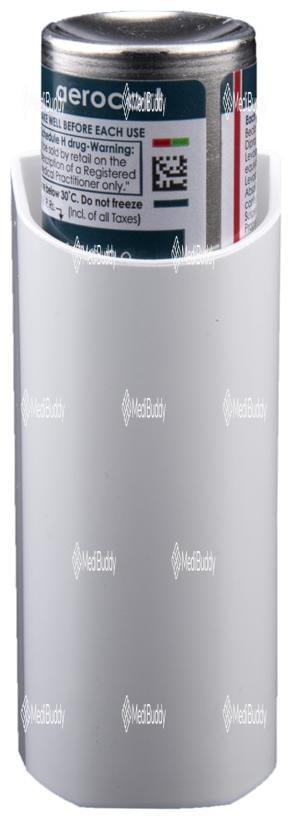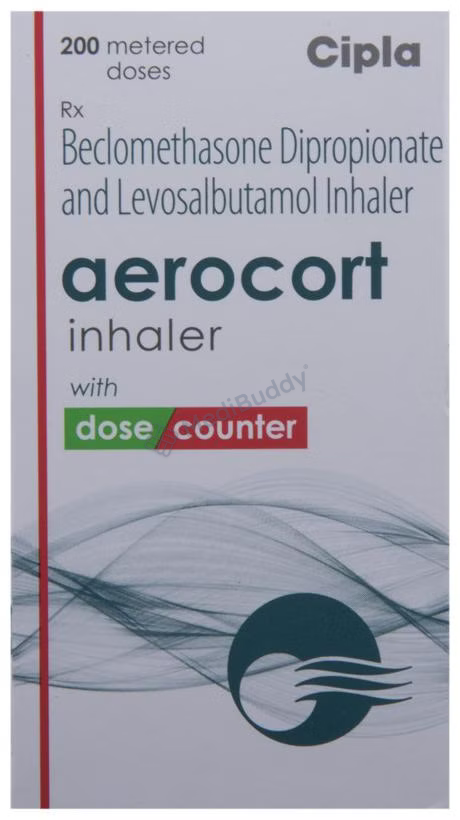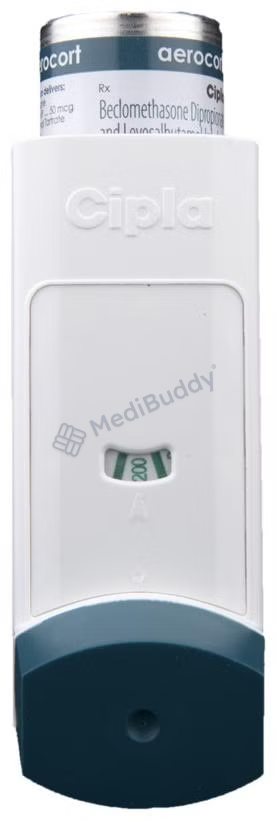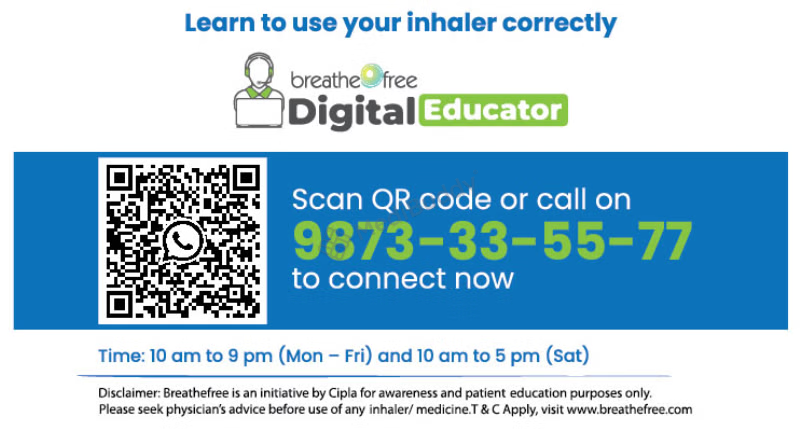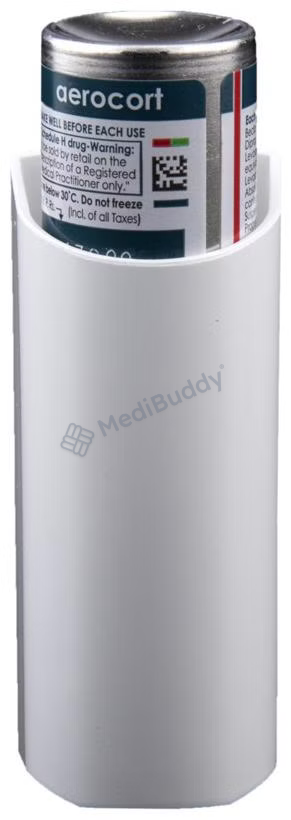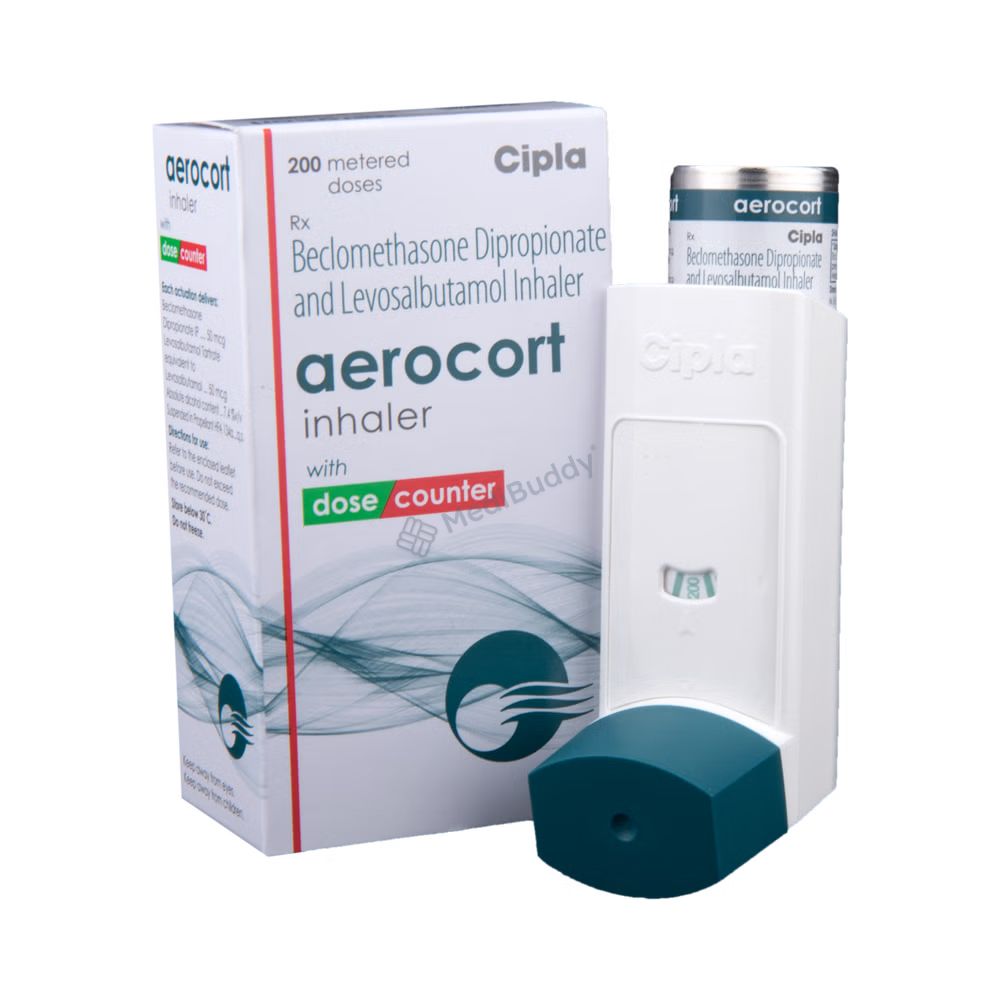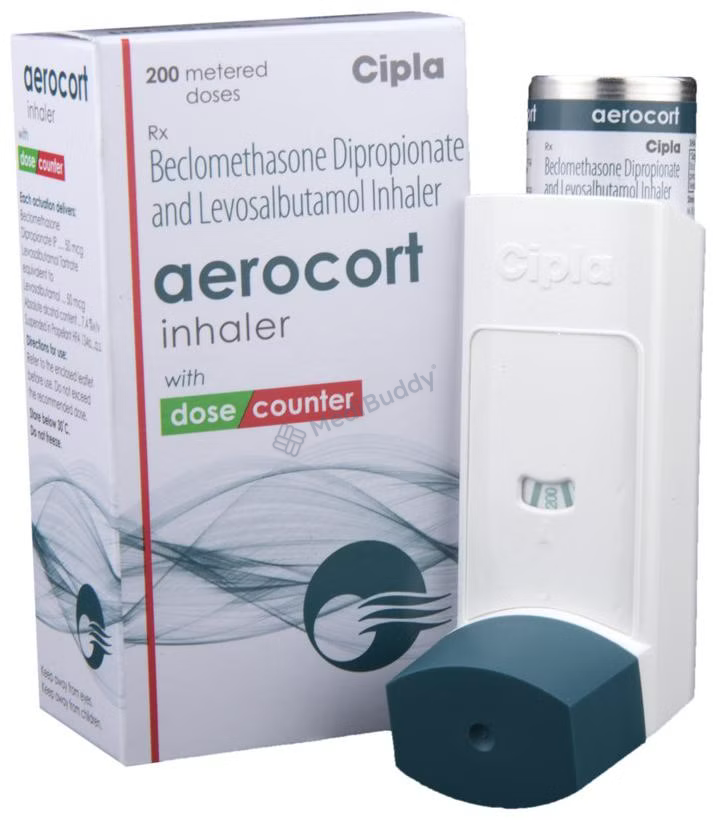Aerocort Inhaler
By Aerocort
Rx
200mdi Inhaler in a Packet

Composition
Levosalbutamol(50mcg) + Beclometasone(50mcg)

Manufacturer - Cipla Ltd
Cipla House, Peninsula Business Park, Ganpatrao Kadam Marg, Lower Parel, Mumbai-400013

Expires on or after
January, 2027
About Aerocort Inhaler
Aerocort Inhaler is a combination medication primarily used in the treatment of asthma. Asthma is a condition affecting the airways, leading to symptoms like wheezing, shortness of breath, and coughing. The inhaler consists of Beclomethasone, a corticosteroid that prevents inflammatory reactions in the body, and Levosalbutamol, a bronchodilator that relaxes muscles and widens the airways in the lungs for easier breathing.
It is crucial to follow your doctor's instructions on how often to use the Aerocort Inhaler. The medication may not show immediate effects, but over time it will help in controlling asthma symptoms. Continual and regular use of the inhaler is necessary for its effectiveness, even when you are not experiencing any symptoms. Discontinuing the inhaler without consulting your doctor might worsen asthma symptoms. However, it is important to note that the inhaler should not be used for sudden asthma attacks; a quick-relief inhaler should be used in such situations.
It is common to experience side effects such as hoarseness of voice, sore throat, fungal mouth infections, respiratory tract infections, headache, and muscle cramps with Aerocort Inhaler use. These side effects can be managed by rinsing the mouth and throat with water or by consulting your doctor. Additionally, there are rare but serious side effects that should be discussed with your healthcare provider. It is recommended to avoid triggers that worsen asthma and to refrain from smoking while using this medication.
Consult your doctor if you are pregnant, planning to become pregnant, or breastfeeding before using Aerocort Inhaler. Inform your doctor about any existing kidney or liver issues for proper dosage adjustments. The inhaler is safe for both adults and children above the age of 4 years. It is advisable to avoid alcohol while using Aerocort Inhaler as it might interact with the medication. Always keep your doctor informed about your overall health condition and any other medications you are taking to prevent any adverse interactions.
Benefits
The Aerocort Inhaler provides numerous benefits for individuals suffering from asthma. One of the key advantages is its ability to widen the airways, making breathing easier for those experiencing respiratory distress. This inhaler is especially helpful in relieving symptoms such as tightness in the chest, shortness of breath, wheezing, and coughing that are common with asthma. By containing Beclomethasone, a steroid that targets inflammatory mediators and cells, the Aerocort Inhaler effectively combats inflammation and swelling associated with asthma. Additionally, the presence of Levosalbutamol, a short-acting beta-agonist, helps relax the smooth muscle cells in the airways, facilitating smoother airflow. Regular use of Aerocort Inhaler not only provides immediate relief but also aids in managing asthma symptoms in the long term. It is essential to note that incorporating regular exercise and yoga into the treatment regimen can further enhance the overall health and well-being of individuals with asthma. In conclusion, Aerocort Inhaler stands out as a potent solution for managing breathing difficulties and treating the underlying inflammation characteristic of asthma, offering significant relief and improved quality of life for asthma patients.
How to use the Aerocort Inhaler
To properly use the Aerocort Inhaler, start by checking the label on the inhaler for specific directions. Before each use, make sure to shake the inhaler. When ready to use, breathe in from your mouth and press down on the inhaler once to release the medication. Hold your breath for about 10 seconds to allow the medication to reach your lungs effectively. Repeat this process until you have taken the number of puffs as advised by your doctor. After using the inhaler, it is important to rinse your mouth thoroughly with water and then spit it out to prevent any potential side effects.
If you are using Rotacap or Respicap, remember that these are for inhalation only and should not be swallowed. Place the capsule at the bottom of the rotahaler or repihaler, then twist the mouthpiece until you hear a click sound. Breathe in deeply through the mouthpiece and hold your breath for 10 seconds. After inhalation, remove the device and breathe out normally.
For Inhaler or Transhaler, hold the device with the mouthpiece facing downwards. Place the mouthpiece between your teeth, seal your lips around it, and press down on the inhaler to release the medication. Breathe in slowly, hold your breath for 5 to 10 seconds, and then breathe out slowly. Repeat these steps until you have taken the recommended number of puffs as prescribed by your doctor.
It is important to use the Aerocort Inhaler every day as directed by your doctor until you are instructed to stop. Remember to only inhale the medication through your mouth into your lungs, not through your nose. Follow your doctor's instructions carefully regarding the number of inhalations and dosing intervals. After each use, rinse your mouth with water and spit it out or brush your teeth.
Lastly, do not begin using the Aerocort Inhaler without proper instruction from your doctor or healthcare provider. It's essential to learn how to use the inhaler correctly to ensure the medication is effectively delivered to your lungs for optimal treatment.
Uses of Aerocort Inhaler
Aerocort Inhaler is primarily used in the treatment and prevention of asthma and Chronic Obstructive Pulmonary Disease (COPD). It helps in relieving symptoms such as wheezing, shortness of breath, coughing, and chest tightness that result from the narrowing of airways. By effectively opening up the air passages, this inhaler provides relief to individuals suffering from these respiratory conditions.
What conditions Aerocort Inhaler treats?
Aerocort Inhaler is commonly used to treat asthma, a respiratory condition that affects the airways causing inflammation and mucus build-up, leading to symptoms like difficulty breathing, wheezing, coughing, and chest tightness. These symptoms can vary in severity and may require immediate medical attention in case of worsening symptoms, especially in emergency situations.
Should you consult a doctor?
It is important to seek your doctor's advice before using Aerocort Inhaler if you have a history of fits, diabetes, thyroid problems, or if you are currently using or have recently used any other steroid medication. If you experience worsening symptoms such as increased difficulty in breathing, chest tightness, rapid heart rate, or shakiness after using the inhaler, it is recommended to consult your doctor immediately. Additionally, if you notice any new or unusual side effects while using Aerocort Inhaler, it is important to seek medical attention promptly. Seeking prompt medical advice ensures that any potential concerns or issues can be addressed promptly by your healthcare provider.
Side effects of Aerocort Inhaler
When using the Aerocort Inhaler, some common side effects that may occur include hoarseness of voice, headache, dizziness, pharyngitis (sore throat), vomiting, bronchitis (inflammation of the airways), dryness in the mouth, cough, nausea, thrush (yeast infection causing sore patches), throat irritation, gastrointestinal motility disorder, upper respiratory tract infection, fever, oral thrush, dry mouth, mouth infection, and sore throat. These side effects are usually mild and tend to improve as your body gets used to the medication. However, if these symptoms persist or if you are concerned about them, it is advisable to consult your doctor.
Rare but serious side effects that may require immediate medical attention include exacerbation of previous conditions, severe allergic reactions (such as sudden wheezing, cough, shortness of breath, skin rash, swelling of the face, lips, tongue, or throat), breathing difficulties, fast heartbeat leading to fainting, palpitations, tremors, nervousness, signs of reduced adrenal function (such as nausea, vomiting, stomach pain, weight loss, loss of appetite, tiredness, feeling faint, sweating, and possible fits), vision changes, sore tongue, and sore throat, among others. If you experience any of these severe side effects, stop using the Aerocort Inhaler and contact your doctor immediately for appropriate medical intervention.
Safety advice

liver
Regarding the safety advice for the liver when using Aerocort Inhaler, there is no known interaction or established information available in relation to liver issues. This means that there are no specific warnings or precautions specifically related to the liver for this inhaler. It is always recommended to consult with your doctor for proper guidance before using Aerocort Inhaler to ensure the safe and effective use of the medication.

kidney
No interaction or adverse effects on the kidneys have been found or established with Aerocort Inhaler.

alcohol
When using Aerocort Inhaler, be cautious as it may increase drowsiness when combined with alcohol.

driving
It is safe to drive when using Aerocort Inhaler as there are no known interactions to impair driving abilities.

pregnancy
Aerocort Inhaler may not be safe to use during pregnancy, as animal studies have shown harmful effects on the developing baby. Limited studies in humans are available. Your doctor will assess the risks and benefits before prescribing, so consult them.

breastfeeding
Aerocort Inhaler appears safe during breastfeeding. Limited data indicates it poses minimal risk to the baby.
Age above 75(Geriatrics)
Aerocort Inhaler should be used with caution in elderly patients (aged 65 years or above). Therefore, consult your doctor before using it.
Age below 6 months(Pediatrics)
Aerocort Inhaler can be used in children (aged 4 years or above) if prescribed by the physician. Therefore, consult your doctor before using it.
Consumption warning before consuming Aerocort Inhaler
Before using Aerocort Inhaler, make sure to talk to your doctor if you have any allergies to its components. It is important to inform your doctor if you have any medical conditions such as hypersensitivity, thyroid problems, circulation disorders, lung infections, low potassium levels, diabetes, glaucoma, bone issues, or gastric problems like lactose intolerance. If you are pregnant, planning to become pregnant, or breastfeeding, consult your doctor before using the inhaler. Make sure to provide your complete medical history to your doctor, including any use of antidepressants, asthma medications, corticosteroids, beta-blockers for blood pressure, or diuretics. Additionally, it is advisable to consult your doctor before consuming alcohol with Aerocort Inhaler to avoid any potential interactions.
Disease interactions
When using Aerocort Inhaler, it is essential to inform your healthcare provider about any existing health conditions you may have. This includes hypersensitivity, thyroid problems, circulation disorders, tuberculosis, lung infections, low levels of potassium, diabetes, as well as gastric issues like lactose intolerance and inflammatory bowel disease (IBD). By sharing this information with your doctor, they can determine if using Aerocort Inhaler is safe for you and make any necessary adjustments to your treatment plan to avoid potential interactions with other medications or health conditions.
What if you forgot to take Aerocort Inhaler?
If you forget to take a dose of Aerocort Inhaler, try to use it as soon as you remember. But if it's nearly time for your next dose, it's better to skip the missed one and resume your usual dosing schedule. Avoid taking a double dose to make up for the missed one. It's important to stay on track with your prescribed dosage to ensure optimal effectiveness of the medication.
What happens if you take overdose of Aerocort Inhaler?
In the event that you or someone else has taken more than the prescribed amount of Aerocort Inhaler, it is crucial to seek medical help without delay. Overdosing on Aerocort Inhaler can lead to various symptoms such as seizures, chest pain, fluctuations in blood pressure, an irregular heartbeat, feelings of nervousness, headaches, tremors, dry mouth, nausea, dizziness, fatigue, tiredness, and difficulty sleeping. If you experience any of these symptoms after using Aerocort Inhaler, promptly contact your healthcare provider or go to the nearest hospital for immediate assistance.
Related lab tests
For monitoring the effectiveness of the Aerocort Inhaler, doctors may request a few related lab tests. One important test is the Absolute Eosinophil Count which measures the number of eosinophils in the blood. Eosinophils are a type of white blood cell that can increase in certain conditions like asthma or allergies. By tracking the absolute eosinophil count, healthcare providers can gauge inflammation levels and assess the response to treatment with the Aerocort Inhaler.
Another test that may be relevant is the Complete Blood Count (CBC). This test provides detailed information about different types of blood cells, including red blood cells, white blood cells, and platelets. By analyzing the CBC results in conjunction with the Absolute Eosinophil Count, healthcare professionals can get a comprehensive view of the patient’s overall health status and how their body is responding to the Aerocort Inhaler therapy.
In summary, the related lab tests for monitoring the use of the Aerocort Inhaler include the Absolute Eosinophil Count and the Complete Blood Count. These tests help healthcare providers assess the effects of the inhaler on inflammation levels and overall blood cell health.
Additional Information
| Habit Forming | No |
| Chemical Class | - |
| Therapeutic Class | RESPIRATORY |
| Action Class | - |
FAQs
Disclaimer
The information provided on this website is to the best of our abilities to ensure it is accurate, reliable, and reviewed by a team of professionals. It should not be used to diagnose, prevent, or cure any health problem. The information presented here is not intended to create a doctor-patient relationship or replace a registered medical practitioner's advice, diagnosis, or treatment. The absence or provision of any information or warning regarding any medicine should not be assumed as an implied or explicit assurance of safety or efficacy. We highly recommend consulting your registered medical practitioner for all queries or doubts related to your medical condition. Do not ignore professional medical advice or delay seeking it based on the content encountered on our website. We intend to support, not replace, the doctor-patient relationship.
₹298.13
₹331.25
10% OFF
Inclusive of all taxes
Content verified by

Dr. Abdullah Khan
MBBS - General Medicine
Last update on 01-Oct-2024
